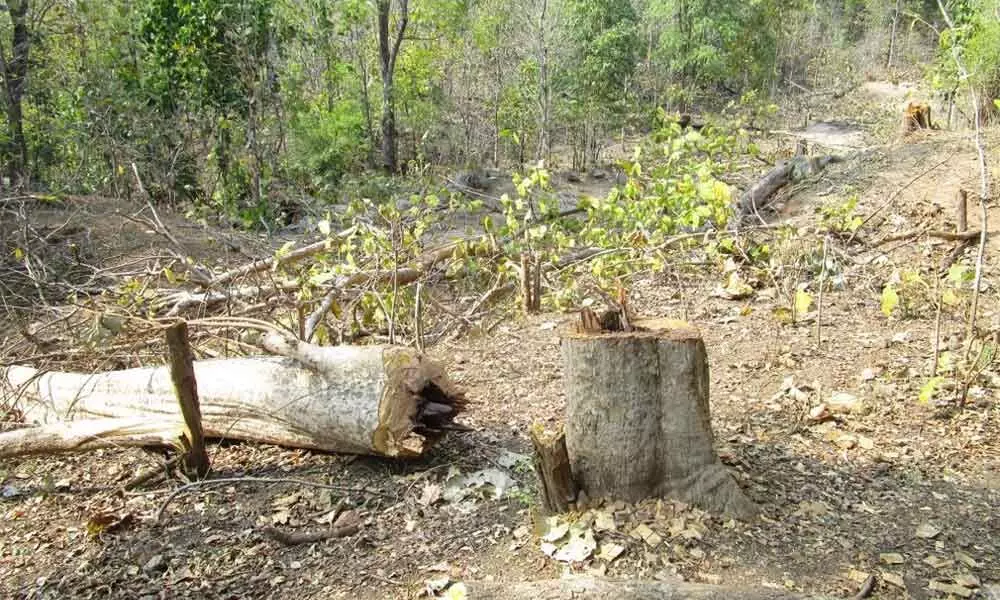Stripping Telangana of its green cover in the name of Podu!
 Stripping Telangana of its green cover in the name of Podu!
Stripping Telangana of its green cover in the name of Podu!Monsoon has arrived in Telangana and the Forest staff have been given targets for afforestation under Telanganaku Haritha Haram (TKHH), the Chief Minister's ambitious project that aims to see the State covered with 33% forest, but the current actual statistics stand at a meagre 17% of decent forest cover.
Monsoon has arrived in Telangana and the Forest staff have been given targets for afforestation under Telanganaku Haritha Haram (TKHH), the Chief Minister's ambitious project that aims to see the State covered with 33% forest, but the current actual statistics stand at a meagre 17% of decent forest cover. TKHH is into sixth year, yet there is a lot of work to do, and reforestation activity before that goal can even be in sight. As the officials try to retrieve the fallow encroachment areas of forest lands (can be confused conveniently as Podu lands), the villagers resist outnumbering the uniformed staff and the atmosphere is ripe for a skirmish between officials and people, each of them trying to protect the lands that they believe belong to them. Already dozens of such incidents have been reported in a familiar routine in forested districts of Telangana, a Ranger puts it, "the onset of the monsoon is the onset of the conflict".
During the election time, the 'Podu land' becomes a hot topic with promises and counter promises for settlement granting rights. There are a spate of fresh encroachments and removal of retrieved plantations. The misplaced usage and wrong connotation of widely used word 'Podu' generates expectations railing up of the sentiments that coverts to votes and grab of huge tracts of lands. Podu is known as 'Slash-and-Burn' agriculture, is a form of cultivation is synonymous to shifting cultivation generally practiced by hill tribes in India, in Telangana by aboriginal tribes Kollams, Koyas and Naikapodus up until 1950s. This phenomenon is only relevant to tribals, as they used to clear the forests and cultivate it for a few years, then move to another parcel of land. This continues in a cyclic form, till they get back to the original land. In the past, when the forest was plenty and populations were low, 'Podu' was perhaps a sustainable practice. But with the advent of roads and modern medicine, the population of tribal people grew significantly. That along with forest conservation laws shifting cultivation was totally outlawed by 1980s, forcing tribal people to do settled agriculture. In Northern Telangana, the routine encroachments by non-tribal people with political patronage are still in vogue deforesting large swathes of lands in Telangana and this certainly cannot be termed as 'Podu', not even loosely.
In pre-colonial India, rulers considered it was the right of peasant and tribal communities to utilise forest products (fuel, timber, fodder, non-wood products) which were considered to be abundant. There was no significant evidence of conflicts over control of forest resources.
In 1850s-60, in order to exploit valuable Indian natural resources and avail them to colonial ports, there was increased demand for timber mainly for railway sleeper and its fuel. This led to commercialisation of forests as British wrested control over forests and subsequent restriction on tribal and peasant communities. The Imperial Forest Department was formed in 1867 and the policies it enunciated had a far-reaching impact on the social, economic and ecological aspects of the forested communities.
The princely States like Hyderabad through its laws encouraged immigration in order to bring virgin forests under cultivation to increase State revenues. Conferring title deeds and jagirs gave legitimacy over land ownership a feudal control over forest lands irrespective of the aboriginal tribes who lived there for ages. Rapid conversion of forests, laying of rail and road opened new avenues that required huge manpower resulting in gradual influx of non-tribal people into exclusive tribal dominated forest areas. The aboriginal tribal people like Gonds, Kollams and Koyas lost lands and rights over forests to the much-advanced immigrants and forest conservancy regime. In order to protect States' interests, tribals were also resettled outside the forests and brought in ambit of State taxes and subsequent corruption leading to rebellions like that of led by Kumaram Bheem of Babijheri in 1940. There were definitely great historical injustices that happened to tribal communities and rebellions were too weak and largely ineffective.
The Forest Rights Act 2006 (FRA) was originally drafted with a motto to undo the historical injustice and give rights both individual (land) and community (resources) to tribal communities. The Act promulgates that rights would be given for lands under cultivation by Scheduled Tribes up till 13th December 2005 and three generations (75 years, ie.1930) for non-tribal people.
Although this Act was much needed, the original Bill was for regularisation of forest cultivation with cut-off date of 1980 and it was meant only for tribal communities and was extended to other forest dwellers as well. The considerations were perhaps made merely for vote bank politics..These arbitrary changes created two major problems, ignited wholesale fresh encroachments in anticipation of getting rights or future recognitions of rights and gave admittance of non-tribes for the first time that gave politicians a novel issue. In Telangana alone, apart from individual claims for over 6,30,714 acres under FRA, there is massive forest encroachments of about 25,94,606 acres. In pursuance of the policy of forest conservancy, large-scale evacuations occurred in 1920s, and mopping up operations continued until 1940, creating an atmosphere of unending insecurity. This led to the famous Kumaram Bheem rebellion and Gond uprising in 1940 waking up Nizam government which appointed Christopher von Fürer-Haimendorf, an Austrian anthropologist to understand the problems in tribal lands. Based on his findings and recommendations, a special Act was enacted, Tribal Area Regulation Act 1946, which had provision for a special officer of Deputy Collector rank called the Social Welfare Officer who had judicial powers. In the next five years, over 1.6 lakh acres of government lands were given to tribal of Adilabad alone. In 1960, when Haimendorf again visited Adilabad, he observed that almost all the land issues were addressed and there seemed no tribal who was landless. In 1959, another Act was enacted - Andhra Pradesh Scheduled Areas Land Transfer Regulation - which stripped judicial powers of Social Welfare Officer and Tribal Panchayat. This led to huge influx of people from Maharashtra between 1965-75. Coincidently in 1976, Banjara community who hailed from Maharashtra were accorded 'scheduled tribe' status that led to massive encroachments in Adilabad district.
In 1972, government with a view to put an end to the problem of encroachments and considering it was human and socio-economic problem, decided to regularise encroachments up to 1964 that led to regularisation of over 1,17,981 acres in Adilabad district. Following the same trend, in 1987 a decision was taken to regularise up until 1980 which was also mandated by Supreme Court.
With the promulgation of Forest Rights Act which saw arbitrary changes of cut-off date from 1980 to 2005, major destruction in forest of Telangana continued until late 2009. A misconception was prevailing that until 2005, all the lands would be regularised and non-tribes were included. In Adilabad alone, over 15,000-18,000 acres of land was encroached in 2008-09 following the enactment of the Forest Rights Act. Till date, the staggered expansions of farmlands and encroachment of forest lands continue and the opportunists exploit the sentiment of people by promising regularisation of encroachments and conveniently calling it as 'Podu'.
As a French saying goes, forests precede civilization and deserts follow them. In this changing climate, there was never greater need than to protect forests. To restore the forests and tribal rights under the provisions of FRA, all the claims should be carefully and judiciously settled, and the rejected claims should not be put in cold storage as ambiguous 'pending claims' by district administration but marked as 'rejected'. Adhering to Supreme Court orders and Forest Policy 1988, no regularisation of post-1980 encroachments should be done which are outside the ambit of FRA. The huge swathes of land that are encroached but not in ambit of Forest Rights Act due to non-tribal encroachments or recent migrations should be taken into account and action plan should be made to restore these forest lands. There has to be a sunset clause to forest rights act and destruction in the name of 'rights' or 'Podu' should be ceased completely. The reversal can happen only when the recent encroachments are evicted sending a clear message that non-eligible encroachments would never be granted rights or titles. The iterative settlement process and promise of regularisation of forest encroachments naming it wrongly as 'Podu' land should not be entertained. Finally, like in our scriptures, forests should be held as 'sacred lands' and should be protected not just from agricultural encroachments but also from the diversion of forests in the name of development.
(The writer is Assistant Director at WCS-India and works for tribal welfare and wildlife conservation in Andhra Pradesh and Telangana)















